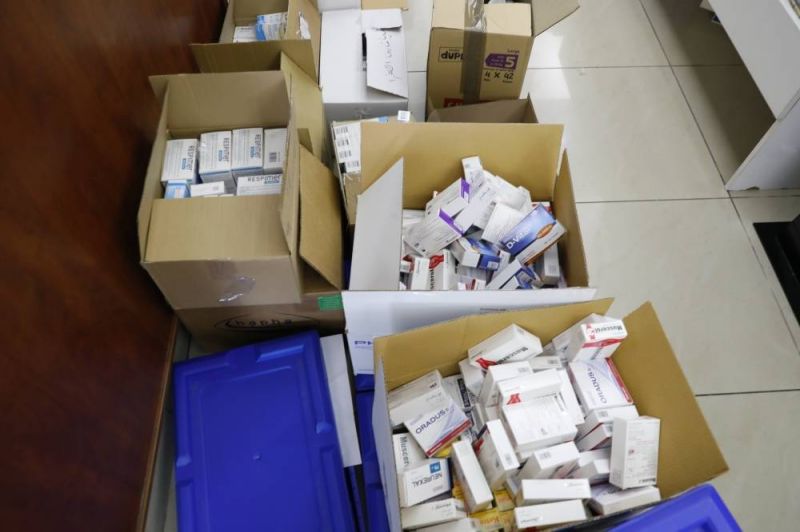
Importers are said to be stockpiling medical supplies as they await BDL to honor subsidy invoices that have been backed up for months. (Credit: Marc Fayad)
BEIRUT — Lebanon’s central bank has said it would pay out $180 million in invoices for subsidized medical supplies and baby formula, enabling goods that are currently stuck in importers’ warehouses to be distributed starting on Friday, the Health Ministry said on Thursday in a statement.
However, the $180 million payment, if made, looks to be only a temporary salve to the current medical shortages in Lebanon, as BDL also cast doubt on whether it would be able to honor pending subsidy invoices for medical supply imports that have piled up over the past several months.
The Health Ministry’s announcement came shortly after caretaker Health Minister Hamad Hassan had foisted responsibility for drug shortages on the bank, telling Voice of Lebanon radio (100.5) that delays in foreign currency payments to importers were causing medical goods to be stuck in warehouses until invoices were paid.
Earlier on Thursday, the president of the private hospitals’ syndicate, Sleiman Haroun, told local media that if drug shortages persist, surgical procedures and labs would be disrupted. Haroun also held BDL responsible for the drug shortages, which he also said were being held at importers’ warehouses in the country.
“People's health cannot be held hostage to your moods and your financial policies. Enough!” Hassan wrote on Twitter that same day.
Hassan wrote that he visited the bank last week, asking unsuccessfully for the release of funds for medicines promised by the central bank.
When reached for comment, Salma Assi, the head of the medical equipment importers' syndicate, told L’Orient Today she could not confirm whether supplies were being stored in warehouses but said BDL was delaying payments, which was delaying imports from abroad.
The head of the pharmaceutical production industry was not able to provide further comment. The pharmaceutical importers’ union could not be reached for comment.
A BDL spokesperson did not respond to L’Orient Today’s request for comment.
However, in a statement on Thursday, the bank stressed that providing subsidized dollars for every invoice for medicine, medical equipment and infant formula — which it said have totaled just over $1.3 billion since the beginning of this year — would require dipping into banks’ mandatory foreign currency reserves, which BDL said it would not do.
The central bank has already reimbursed about $485 million in invoices submitted since January, based on information provided in a recent BDL circular. When added to the payment anticipated by the Health Ministry, the central bank is expected to honor at least about $665 million in invoices.
This leaves an uncertain fate for more than $600 million in invoices for essential medical supplies that are still pending at Banque du Liban in question.
“This total cost that is required from the central bank as a result of a policy to subsidize these medical items cannot be supplied without touching mandatory reserves and this is what the board of the central bank refuses,” the BDL statement said.
As Lebanon’s economic crisis has accelerated since late 2019, BDL has subsidized medical equipment and pharmaceuticals as well as other essential goods such as fuel and wheat.
Importers pay 15 percent of their total bill in US dollars and pay the other 85 percent in lira at commercial banks, which the central bank reimburses dollars at the official exchange rate of about LL1,500 to the dollar, insulating buyers from fluctuations in the parallel exchange market to a degree and enabling buyers to pay foreign suppliers. On Thursday, the lira was buying and selling for more than LL13,000 to the greenback on the parallel market — the weakest rate since late March.
Until the importers receive BDL’s reimbursement payments, they have resorted to buying products on credit, or otherwise securing the dollars themselves.
Lebanon has been grappling with its worst economic crisis in decades. Hospitals have been suffering from equipment and drug shortages due to financial constraints and the rationing of supplies from importing companies, forcing them to reschedule non-emergency services or reduce bed capacity.